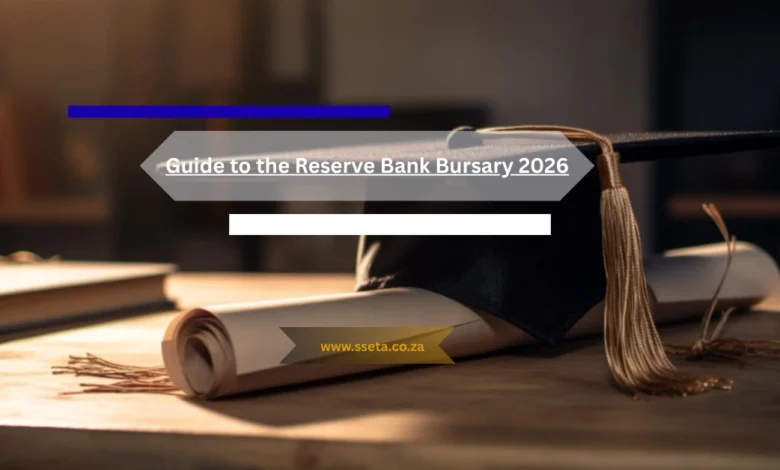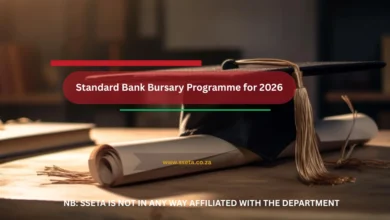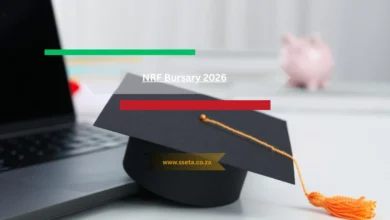Unlock Your Future in Finance: A Storyteller’s Guide to the Reserve Bank Bursary 2026

A Dream Worth Investing In
In a small township in South Africa, a young student named Thando sits beneath the soft flicker of a solar-powered lamp. Her books are open, her mind alive with numbers, graphs, and dreams of working one day in the Reserve Bank of South Africa. But like many bright minds across the country, financial hardship looms like a storm cloud above her ambition.
Thando’s story, however, does not have to end in disappointment. With the Reserve Bank Bursary 2026, students like her—driven, talented, and determined—can transform aspiration into achievement. This guide is more than an explanation; it’s a story of possibility, one that walks you through every part of the journey from hopeful application to professional opportunity.
Why the Reserve Bank Bursary Matters
The Reserve Bank is more than a guardian of South Africa’s monetary policy—it’s a builder of futures. The bursary programme it offers isn’t just about covering tuition or buying textbooks. It’s about empowering young minds to shape the country’s financial health for decades to come.
By supporting studies in Economics, Finance, Accounting, Actuarial Science, and Data Analytics, the bursary is designed to grow a generation that will understand, manage, and evolve our economy.
A Legacy of Empowerment
The Reserve Bank Bursary Programme began with a single goal: to invest in local talent. The bank understood that the economy of tomorrow must be led by those who understand its heartbeat today. Over the years, this initiative has helped hundreds of students who, like Thando, would have struggled to pay for university on their own.
And it’s not just about money. It’s about shaping leaders, creating access, and making education equal for all.
What Fields of Study Qualify?
If you’re interested in the Reserve Bank Bursary, you’re likely passionate about the world of finance. The following study areas are typically eligible for funding:
- Economics
- Actuarial Science
- Accounting
- Banking
- Financial Management
- Law (with a focus on commercial or financial law)
- Information Technology (especially in data science or analytics)
- Mathematics and Statistics
These disciplines aren’t chosen at random. They reflect the Reserve Bank’s long-term need for strategic thinkers who can support its critical operations.
What the Bursary Covers
The financial support is extensive, but the value goes far beyond rands and cents. Here’s what bursary holders can expect:
- Full tuition fees
- Accommodation and meals (if staying in residence)
- Textbooks and academic materials
- A monthly stipend
- A laptop, if required for studies
- Opportunities for internships and holiday work with the Reserve Bank
- Priority consideration for graduate employment
Do You Qualify?
Let’s break down the eligibility criteria to help you determine whether this bursary is for you:
Academic Performance
- For Grade 12 learners: Strong academic performance with at least 70% in Mathematics and English.
- For university students: You must be achieving consistently good marks and be enrolled full-time in an approved programme.
Financial Need
- This is not a merit-only bursary—you’ll need to demonstrate financial need.
- Be ready to provide proof of household income (e.g., payslips, affidavits).
Citizenship
- You must be a South African citizen.
- You’ll need a valid ID and, in some cases, proof of residence.
The Application Process: Step-by-Step
If you meet the requirements, the next step is completing your application with precision and care. Here’s how:
Step 1: Find the Application Form
- Visit the official Reserve Bank website.
- Download application form.
Tip: Never use third-party forms—always apply through the official platform.
Step 2: Prepare Your Documents
Create a checklist of required materials:
- Certified copy of your ID document
- Latest academic transcript or Grade 12 results
- Proof of household income
- Motivation letter
- Letter(s) of recommendation (from a teacher, mentor, or employer)
- Proof of university acceptance (if available)
How to Write a Motivation Letter That Stands Out
Your motivation letter is your moment to shine. Don’t treat it as a formal requirement—see it as a personal invitation to share your journey.
Include:
- What inspired you to pursue your chosen field
- Your future goals and how they align with the Reserve Bank’s vision
- Any challenges you’ve overcome to get where you are
- A personal story or anecdote that shows your drive and character
“I still remember the day I explained inflation to my little brother using marbles. That’s when I knew I wanted to study Economics.” — That’s how you humanise your application.
Deadline and Submission
Deadlines are non-negotiable. Late applications are automatically disqualified.
- Keep an eye out for the 2026 bursary window, which usually opens between May and July.
- Submission is typically online, but the website will confirm accepted methods.
- Save confirmation emails and keep a record of your application number.
What Happens After You Apply?
The Selection Criteria
Your application will be judged on:
- Academic excellence
- Financial need
- Personal motivation and leadership potential
- Relevance of your field of study
The Interview Stage
If shortlisted, you may be invited for an interview—virtual or in-person.
Prepare for success:
- Learn about the Reserve Bank’s history, values, and functions
- Practice explaining your career goals
- Prepare examples that show your problem-solving skills and resilience
Assessment Centre
Some candidates might be invited to an assessment centre, where activities may include:
- Group exercises
- Short presentations
- Aptitude and psychometric tests
The End is Just the Beginning
Winning the bursary is not the final chapter—it’s the start of a new journey. Many bursary recipients go on to intern at the Reserve Bank, complete graduate programmes, and even work in senior financial policy roles.
The bursary not only builds careers—it builds futures that serve the nation.
Alternative Bursaries to Consider
The Reserve Bank Bursary is competitive. While you wait or if you’re not selected, consider these alternatives:
- National Treasury Bursary
- FNB Fund Bursary
- Nedbank Bursary Scheme
- Old Mutual Actuarial Bursary
- Allan Gray Orbis Foundation Fellowship
Apply to multiple opportunities—it’s wise, not desperate.
Final Advice: Your Map to Success
- Start early: Don’t wait until the deadline.
- Stay organised: Use a checklist.
- Be authentic: Your real story is enough.
- Proofread everything: One small error can derail your chances.
- Ask for help: Teachers, mentors, and family members can guide you.
Closing Thoughts: The Power of Opportunity
The Reserve Bank Bursary 2026 is more than funding—it’s a vote of confidence in your future. It’s the key that opens the door to careers in finance, economics, and public service. If you’ve ever wondered whether your dreams are worth pursuing, let this be your sign: they absolutely are.
Like Thando, you can rise from a quiet corner of the country and one day make decisions that influence the entire economy. All it takes is belief, preparation—and this guide.
Start today. Your future in finance is waiting.




